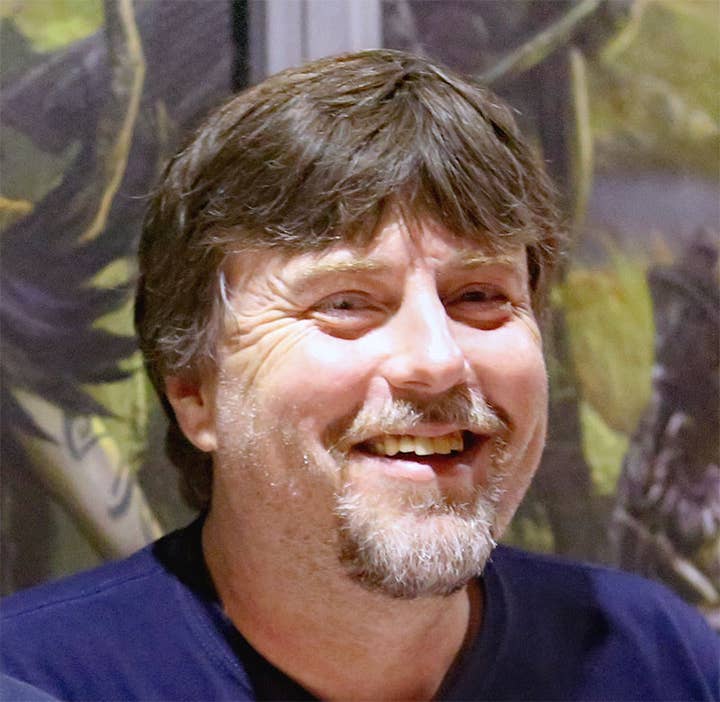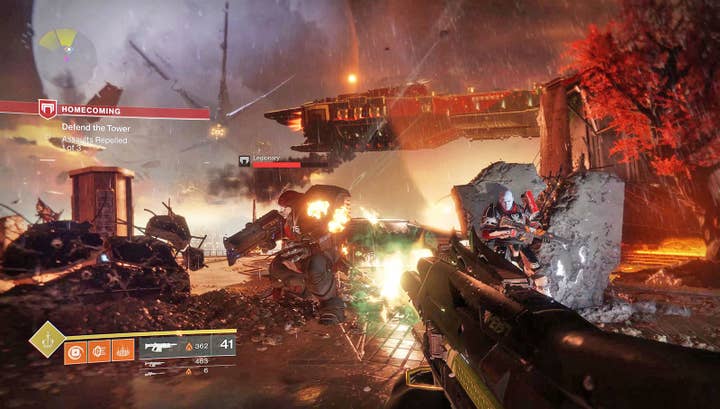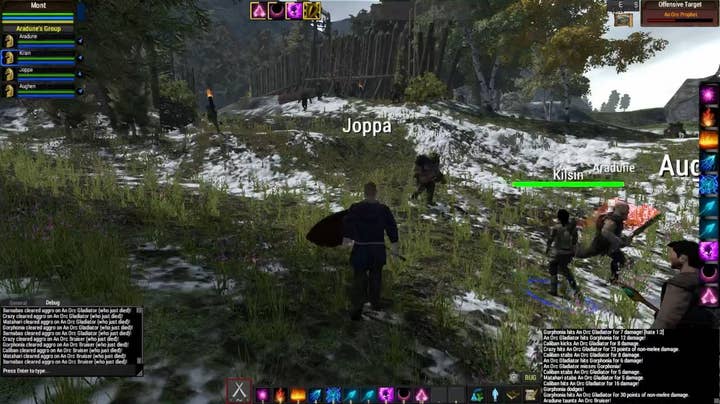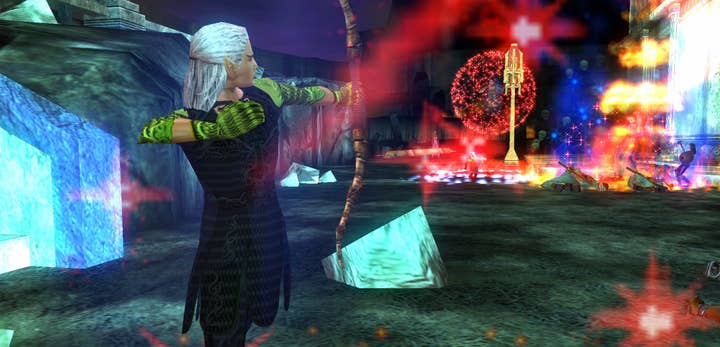Brad McQuaid: "I want to make worlds, not games"
The EverQuest designer on why he will only ever work on MMOs - and why the genre isn't dead yet
Brad McQuaid has built much of his career around online role-playing games - specifically, three of them.
First, there was the game-changing hit of EverQuest in 1999, a title that is still active today. Next came Vanguard: Saga of Heroes, an MMO that defied poor initial reviews and survived for seven years. Today, he is working on crowdfunded fantasy outing Pantheon: Rise of the Fallen, a project he hopes will build on the work he did with Everquest.
It's not unusual for developers to find themselves working on a single genre, but in McQuaid's case it's a conscious - nay, determined - choice. During a 'fireside chat'-style talk at Devcom in Cologne last month, the long-serving developer declared he "only wants to work on MMOs", and we caught up with him to find out why.

"To me, a proper MMO is more than a game," he tells GamesIndustry.biz. "It's a world. I want to be immersed, I want to escape into a fantasy or sci-fi world. [MMO developers are] making the very, very early foundations of the Holodeck. Letting people recreate the 1930s or build new virtual worlds - that's what MMOs are, they're the genesis of that.
"Because they involve real people and that social aspect, because they're so immersive - and will be even more so in the future, with VR coming - I lose myself in them. I don't sit there thinking I'm playing a game; I'm really there. And that's what interests me.
"I still play other games. I played tower defence games on my iPad, but I know I'm playing a game. But if I'm playing a really good MMO, just like watching a really good movie, you're there. You forget that you're sitting there, because it brings you in. That's what MMOs do that a lot of games can't do, and that's personally all I want to do. I want to make worlds, not games."
Admirable sentiment, but isn't the MMO genre dead? No titles have matched the heights of Blizzard's World of Warcraft, and countless have been shut down over the past decade. While there are still outliers like Final Fantasy XIV and Eve Online that continue to be strong, the perception seems to be that there is little point developing a hardcore MMO unless you plan to be free-to-play or simplify the structure for mobile.
"[MMO developers are] making the very, very early foundations of the Holodeck. Letting people recreate the 1930s or build new virtual worlds - MMOs are the genesis of that."
"I think that perception is slowly changing, and we're determined to be at the forefront of changing that opinion," says McQuaid. "It's just something that happens. I don't want to sound all high and mighty but back in the '90s people were saying RPGs were dead - and then Diablo came out.
"People think the RTS is dead, old-style MMOs are dead, that everyone wants an easy game, that no one has an attention span anymore and wants to just hop around. Well, that may be true now that the games space has grown an order of magnitude since Everquest but that doesn't mean the group of players that do want a more involved, social, challenging game don't exist. Maybe since the pie is bigger, they don't occupy as big a space. But they're still there, and they feel orphaned right now, they feel left out."
As such, he describes working on Pantheon as "a great opportunity [to reach] an underserved market", adding: "Even if I wanted to make a hyper-casual MMO - which I don't - it would be going up against Destiny or something like that."

Bungie's sci-fi shared-world shooter - and similar titles like Tom Clancy's The Division - can be argued as another nail in the MMO coffin. The mechanics of a first-person shooter are much more accessible to the masses than comprehensive MMORPG systems, and players still enjoy interacting with millions of fellow Guardians at the same time. Even the focus on farming loot through raids and strikes are similar to WoW's boss fights and instances - and the visual appeal of Destiny compared to traditional MMOs is all too obvious.
McQuaid stresses that this doesn't necessarily present direct competition for something like Pantheon given that his title is aiming for a niche and hardcore audience, but it does highlight some key differences in how such games are marketed today. While Destiny can win players over with short but intensive trailers, MMOs need to go a little deeper.
"Pantheon's not a game that you can just flash 20 seconds of video and viewers are going to go, 'okay, yeah, I get it'."
"If you showed just a two-minute video of Pantheon to someone who wasn't familiar with that style of MMO gameplay and tactical combat, it's harder to convey that depth of the gameplay," says McQuaid. "Whereas if you see something that's visually flash, all happening fast, that's going to attract someone who's more visually oriented. So yeah, that's a real challenge.
"The way to do it is to get people playing it, to get the influencers playing it, to get people who have big audiences on Twitch and so on playing it. That's where we're starting to focus because that gives them enough time to understand the depth of gameplay that we're bringing."
In this way, the world is a very different place than when he last released an MMO. Vanguard's debut in 2007 didn't benefit from the thriving community of YouTubers, Twitch streamers and other influencers that Pantheon stands to tap into. Video, while present, was less prominent than it is today, giving McQuaid's team the chance to convey the Pantheon experience through developer diaries, livestreams and more. Does this make it easier to reach those orphaned MMO players he is so keen to reach?
"Yes, and new people," he says. "We've done big Twitch streams with CohhCarnag. He's answering questions from his audience and he's able to explain the deeper gameplay and there's time for them to understand, for that communication to go on. So it's more of a challenge, but we have no other choice - that's just the type of game that we're making. It's not a game that you can just flash 20 seconds of video and viewers are going to go, 'okay, yeah, I get it'."

Business model is another challenge for anyone making MMOs today. From Star Wars: The Old Republic to Wildstar, many titles in the genre have been compelled to transition towards free-to-play. The EverQuest designer is quick to point out he has "nothing against free-to-play" but he remains a firm proponent of the subscription model that has served some of the biggest MMOs so well.
"You can blow 20, 30 or 50 bucks on one night out. I still think subs are a great deal - you just have to convince [the players]."
That was all well and good in 1999 when EverQuest was released, but in 2017 MMOs have more than just competitors to contend with when it comes to convincing people to pay a monthly fee. Today's entertainment landscape is awash with subscriptions: Netflix, Hulu, Spotify, Apple Music, Xbox Live, PSN, Amazon Prime, your phone bill... the list goes on. In the face of so many monthly payments, how can developers then try to sell another?
"You've gotta make a damn good game," McQuaid says. "You've got to have the compelling content - and that's true of Netflix or anyone else. If they didn't put The Defenders out, I probably wouldn't susbcribe.
"When you think about it, what does it cost to go see a movie or take your partner out to dinner? That's one night and you can blow 20, 30 or 50 bucks. I still think it's a great deal. You just have to convince [the players]."
Like World of Warcraft, Final Fantasy XIV and so many other MMOs, Pantheon will offer a hybrid model whereby it will be free to try up until a certain character level. Once players reach that limit - the exact details of which have yet to be decided - they'll need to subscribe in order to continue. This, too, is part of the game's marketing.
"If I asked them to subscribe upfront, players will ask why and they won't be sure if they want to," says McQuaid. "But if they play the game for a couple weeks and they love it, they'll pay the sub."

The key to success for any MMORPG is an active userbase, one loyal enough to continue playing for the long-term. This depends heavily on that social aspect McQuaid is so interested in and the organic relationships that develop between players irrespective of their feelings about the developer.
However, studios today can't afford to sit back and hope that friendships are forged. McQuaid's solution for Pantheon has been a matchmaking interface that allows players to enter as much personal information as they like in the hopes of finding similar players.
"We can't leave it up to the player. Onboarding players into a social grouping MMO is probably the most important challenge we face."
"We can't leave that up to the player, we've got to be proactive," he says. "Onboarding players into a social grouping MMO is probably the most important challenge we face.
"Basically [Pantheon's] the opposite of World of Warcraft, where when you do an instance it teleports in a bunch of randoms, everybody runs through and disappears and you probably didn't even say anything... We're going to do everything we can to facilitate you finding online people who are really your friends."
He jokingly refers to the system as 'pHarmony', pointing to the similarities between how Pantheon's matchmaking works and the premise of a certain popular dating website. We can't help but resist asking if there's more developers should be learning from online dating.
"Yeah, because it's similar," McQuaid explains. "You're finding people that have the same interests, when do they play, how do they play. Then you have the social gamers that are a big part of it, and they talk about interests outside of the game. Some people don't; they just want to roleplay or focus on the game, but there are people that love to just sit and chat about their hobbies. It's all up to the player, however much information they want to give to help us find a match."
During his Devcom talk, McQuaid pointed to his devotion to MMOs as something other developers ought to consider. Not that genre specifically, of course, but focusing on a particular audience - in his case, the abandoned MMO fans - and resisting the temptation to build something that appeals to everyone.
Of course, for smaller studios and independent developers, this might seem inherently risky. A broadly appealing game will have a much better chance of recouping costs and growing your audience, whereas targeting a niche requires a much higher awareness (and purchase rate) within whatever limited circle you're aiming for. McQuaid allays such fears by reiterating something else he said during his talk.
"The revenue model needs to match the game," he says. "If you've designed a game - let's say it's a mobile game - you need to bring people in, you need to expose it to as many people as possible because only a certain percentage are going to monetise, then I agree, it becomes about getting as many people playing as possible because you know some will spend more money.
"But if you're making a game that is meant to be played for a longer period of time, then I think you should have a target audience and you should spend the time making the best game for them because you want to keep them around. Every player is important - not just the 3% or 5% that monetise. And especially if you're using the sub model, keeping them around and keeping them happy and making it more than a game and more of a home, that's what's important."
